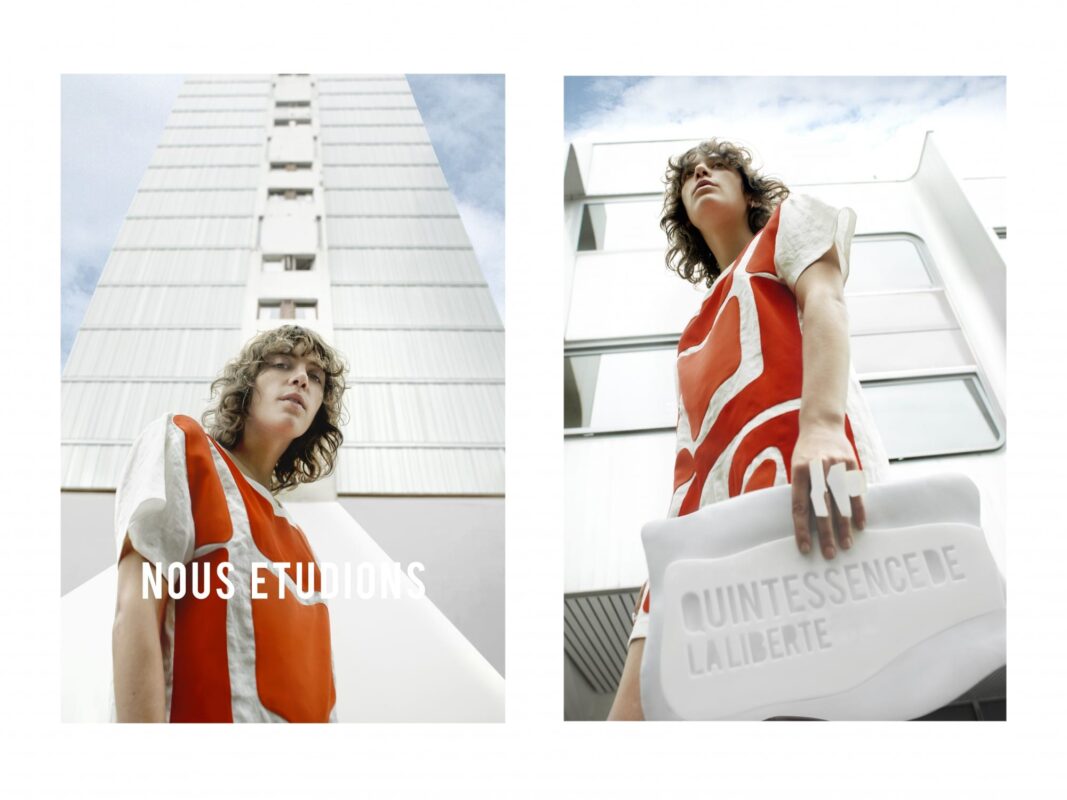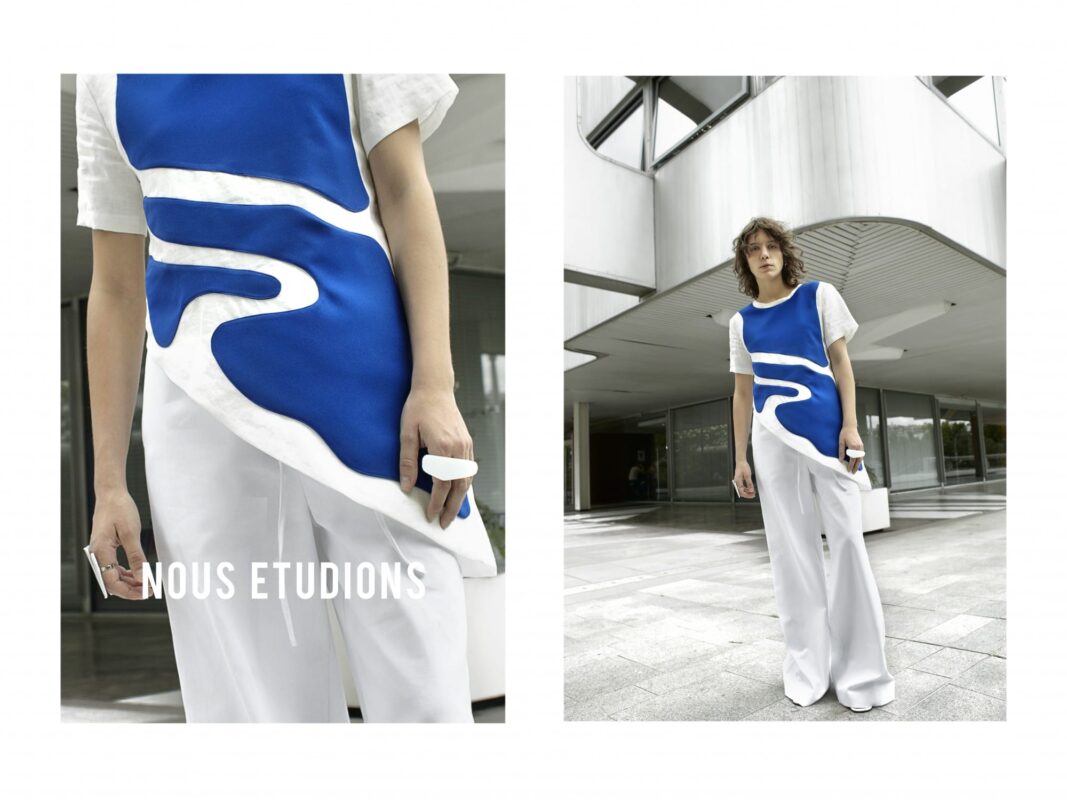Thirty-five year old Romina Cardillo invited us to her study in the commercial neighborhood of Belgrano, Buenos Aires.
The building itself is a clear synthesis of her profile and story as a young designer. When you cross through the main door you see images from international magazines' fashion productions imitating a punk rock adolescent's room.
There are well-ordered massive piles of fabric rolls everywhere, waiting to be cut and used. Moving upstairs, you will find different items from Nous Etudions—a coat over a white board on the first stair landing like a contemporary painting, a piece of a laser-cut accessory that appears in Nudite, her last SS16 collection.
The place gives off a very calm atmosphere, and you are surrounded by the colors of the next winter collection waiting to be shown to the public.
MM. Who are you Romina? Where do you come from?
RC. My mother is Estela Vazquez, one of the owners of Maria Vazquez, my family's business. There I started from the bottom as a hanger stocker. I then became a cashier and so on until I got to the most interesting part, the design and communication of the product.
I appreciate the experience because it gave me the whole picture of fashion brand management.
Unlike most new graduates, I was fortunate enough to live every stage of the administrative process before my academic studies in fashion design at UADE (Universidad Argentina de la Empresa).
Then I met Turquesa Topper, one of my mentors at school. She taught me that fashion design is a communication discipline with a strong social role. She introduced me to geniuses like Martin Margiela and Rei Kawakubo. Tbat was my starting point to grow creatively.
MM. That was the moment to prove yourself with your own project, right?
RC. Definitely. After my school years and my experience in business, I created Grupo 134, a brand menswear brand with an eco and social conscience. At the time, the message was a little bit aggressive. It was a project that reflected on my punk rock years. I'm a huge fan of Fun People a 90's Argentinian hardcore punk rock band.
I used to be more rebellious and anti-establishment. However, I learned to connect content and ideals like animal rights with fashion through working with organizations like Greenpeace.
We even got to sell in Berlin. It was an hugely enriching experience.
MM. How does it feel being a mother and a designer?
RC. I'm a new person. Since my boyfriend and I decided to become parents, my general vision of the universe has becme more positive. Being a mother made me more aware and turned me into a whole new world; my daughter's, Filipa. Now I can walk in someone's else shoes form a more comprehensive picture of the world. I'm in love with my child's perspective and kindness.
MM. What does Nous represent for you?
RC. Nous reflects the maturity of my career. It represents my new research about my heaviest questions: trying to find a definition for my identity in the local market, and curiosity about the art of the people of our country.
I started to work with Wichis (an indigenous tribe who lives in Chaco province in the northern part of the country).They craft 'chaguar', a textile used to protect themselves from the wild, by hand using an ancient textile technique. The resistant fibers used come from a plant found in the semi-arid Chaco, in the provinces of Salta and Formosa, and have been used since prehistorical times. The Wichí, a nation of hunter-gatherers, use it for making bags, ponchos, clothing, nets, ropes, and even for cosmetics. It is much more than a fiber; it is a connection with nature and the universe.
This exchange of reciprocity has its own rhythm that has nothing to do with fashion as we all know it. Two worlds meet, not to colonize another culture, but to exchange. There must be reciprocity, there must be a mutual benefit for both sides.
MM. Since the presentation of Nudité, at BAFWEEK (Buenos Aires Fashion Week) You have had great press promotion. How did you go from being the eco brand to the poetic minimal ultra feminine brand working with celebrities?
RC. Well, it was part of my maturity process as a commercial brand with a sophisticated product for consumers who respect nature.
I understood that I didn't need to be reiterating the same speech about being eco-friendly. That's something that works for myself and my method of production. I want to let the public discover the product amongst themselves. I take the place of an observer.
My last communication strategy was working with influencers like Calu Rivero, a young actress, DJ and model who linked the brand with the particular beauty and body I design for. But the quality of the product speaks for itself, so I enjoy how people connect to my design in a much easier way.
MM. How do you deal with the idea of selling outside the country?
RC. The opportunity is always present. We have public interested in the label from different part of the globe. In South America the first optional countries are Chile and Uruguay. There is also the possibility of opening a store in Spain.
After working with a friend of mine, Clara Deshayes (26), a young French DJ and model who worked for Jaquemus, Vetements and Acne, people from different sides of the planet began showing interest right away.
In the end, my priorities are here in my country. I want to keep expanding and growing strong here. Next month we are opening our first store in the neighborhood of Palermo Soho. Right now we are focusing on that.
MM. After Grupo 134, will you ever design for men again?
RC. Maybe next summer, but not for men specifically. Nous is not even for women only. My boyfriend, male friends and even the photographers for the campaigns tell me they would wear some items. I don't design for the old idea of Latin-American women's curvy bodies. I'm focused on a unisex androgynous kind of beauty. The silhouettes of my preference are adherent and oversized. But everybody is invited to try Nous without prejudice.
MM. Do you see yourself as a fashion design teacher at any university?
RC. I don't feel I have the nerve to be a fashion teacher. But never say never. People invite me for different sort of talks about fashion and social ethics. A few months ago I participated in 'Generacion Vitnik' as a mentor. It was a contest for new designers. My contribution to the young community of designers is my experience.
What I'm most concerned with in regards to the fashion school and business issue is the lack of consciousness about creativity in business management. Both concepts must work together. Products can't be pure experiment. They have to have functionality. I always say in my talks, "let's see how we dress". We can make designs with original and creative content but we must not fear to massive production.
MM. How do you describe your creative process?
RC. My process is chaos. It depends on my mood. But my constant is a social matter narrative.
For my next AW16 I took as a reference the Tibetans and their characteristic use of clothing. I'm always about function. I'm not pretentious about the form in my designs.
So the main idea is to go with a new type of humanity that isn't from any one particular place. I design for the world citizen.


